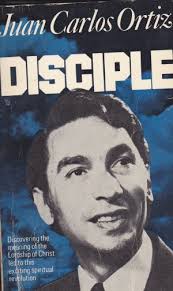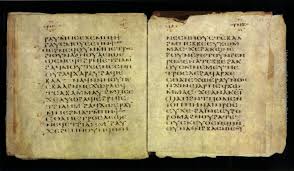Introduction

In the 1990’s a famous Argentinian Pentecostal pastor, Juan Carlos Ortiz, caused offence at an Evangelical conference. He held a Bible high in the air and proclaimed, “The Bible is not the word of God! Jesus is!” I hope to show that Juan Carlos is both right and a main-stream Christian, and how this approach makes the Bible much more exciting.
Revelation and Reason
The Anglican position from the beginning is that we need to use revelation, tradition and reason. Richard Hooker (1554-1600) argued that we were entirely at liberty to use our reason about “things indifferent”, i.e. not central to a spiritually transforming faith, such as church government, even if there was a specific command in Scripture. We are free to think!!
In the time of Jesus, Josephus tells us that 22 books of the Old Testament, or Tenach (Law, Prophets, Writings) were authoritative, with the first five written by Moses. (Actually in our Bibles there are 28 books, taking the12 minor prophets as one book).

So the first Christians did think that the Scriptures, ‘the Law and the Prophets’ were inspired. But that made them useful, not inerrant. “All scripture is inspired by God and is useful for teaching, for reproof, for correction, and for training in righteousness.” (2 Timothy 3.16.) A prime example is in Acts 15 when James and the other apostles decided they could ignore the clear command of the Law: ‘Any uncircumcised male who is not circumcised in the flesh of his foreskin shall be cut off from his people; he has broken my covenant.’ (Genesis 17.14) Many Christian men are rather glad they did ignore it!
The New Testament explicitly refutes the idea that what we have are words directly transmitted by God. Here is how Luke opens his Gospel: “I decided, after investigating everything carefully from the very first, to write an orderly account for you, most excellent Theophilus…” In other words, Luke and Acts are the product, not of inspiration, but of investigation.
Paul in one place explicitly denies inspiration:”To the rest I say—I and not the Lord… Now concerning virgins, I have no command of the Lord, but I give my opinion as one who by the Lord’s mercy is trustworthy” (1 Corinthians 7.12, 25). Not authority but opinion. The same goes, I think, when Paul writes about the place of women in the church.
Not inerrant but apostolic

The basis on which the Early Church Fathers chose what books should be included in the the Bible was simple. Did they come from the original apostles, Peter, John, James, and, a late entrant, Paul? So the criterion was, do they come from good witnesses? The Letter to the Hebrews was included because, although the eastern church did not think it was by Paul (and it certainly wasn’t), the western church thought it was and they won. A similar revered writing, ‘the Shepherd of Hermas’ did not make it in.
This means that we are at liberty to use our own brains. A friend once heard a church-warden read 1 Corinthians 11.2-16 as the second lesson during an evening service on Jersey, about how women should cover their heads during worship. She read it well, and ended with, “I am not going to say this is the word of the Lord. It is just St Paul being silly.” And yet I and millions of others find the Bible an amazing collection of books.
1 Amazing first person memoirs
Just imagine the Bible did not exist. Then in some ruins of Roman Thessalonica some parchments were discovered which were a series of long letters sent by one of the first Christian leaders. It would be an amazing discovery, people would have to rewrite the whole history of the early church. Well, we have those letters: Romans, 1 & 2 Corinthians, Galatians. Even the most sceptical scholars agree that these were by St Paul, written between 55 and 57 AD. As Paul himself signed off one of them: “See what large letters I make when I am writing in my own hand!” (Galatians 6.11)
In the Old Testament we have the personal memoir of Nehemiah, Governor of Jerusalem c. 440 BCE. A detailed writer but not a an easy person to get on with. Then in Isaiah, Jeremiah, and Ezekiel we have the actual words of Jewish prophets from 740 to 540 BCE. E.g.: Now the word of the Lord came to me saying, ‘Before I formed you in the womb I knew you, and before you were born I consecrated you; I appointed you a prophet to the nations.’ (Jeremiah 1.4-5, 627 BCE)
2 Amazing contemporary reportage
If we go to contemporary accounts, the evidence is equally mind-boggling. We have the clearly contemporary accounts of King David’s adultery with Bathsheba and ensuing family dissensions and civil war, c.1000 BCE; and the grisly but gripping account of Jehu’s bloody coup d’état in 841 BCE:

“When Jehu came to Jezreel, Jezebel heard of it; she painted her eyes, and adorned her head, and looked out of the window. As Jehu entered the gate, she said, ‘Is it peace, Zimri, murderer of your master?’ He looked up to the window and said, ‘Who is on my side? Who?’ Two or three eunuchs looked out at him. He said, ‘Throw her down.’ So they threw her down; some of her blood spattered on the wall and on the horses, which trampled on her. Then he went in and ate and drank; he said, ‘See to that cursed woman and bury her; for she is a king’s daughter.’ But when they went to bury her, they found no more of her than the skull and the feet and the palms of her hands.” (2 Kings 9.30-35)
All this hundreds of years before the Greek writer Herodotus (484 – 425 BCE), ‘the Father of History’.
3 The amazing Jesus
The Bible contains four accounts of the life of Jesus. It is my conviction that Mark is the earliest, written about 50 AD by an early follower of Jesus who was present in Gethsemane when Jesus was arrested (Mark 14.51); that Luke was written about 60 – 62 AD and is a reliable reporter; that Matthew is a church product and tampers with the tradition, making Jesus more judgemental than the others do; and that John is an enigma, though I now think it was written by a Jerusalem disciple who knew Jesus personally – but I could be wrong! You can find the arguments for these convictions in a series of 2019 blogs in bibelinbrief.org.
So in Mark and Luke we have an intimate portrait of Jesus, including, in Mark, some of the actual words that Jesus used in Aramaic, e.g.: ‘He took her by the hand and said to her, ‘Talitha cum’, which means, ‘Little girl, get up!’ And immediately the girl got up and began to walk about (she was twelve years of age). At this they were overcome with amazement. He strictly ordered them that no one should know this, and told them to give her something to eat.’ (5.41-43)
Mark shows us the emotional atmosphere of Jesus’ last journey: ‘They were on the road, going up to Jerusalem, and Jesus was walking ahead of them; they were amazed, and those who followed were afraid.’ (10.32)
Only Mark has the crucial detail about the expulsion of the traders from the Temple, that he would not allow anyone to carry anything through the temple. (11.16) I.e., the action was not just a demonstration, it was an occupation.

Luke has the most wonderful parables, like the Good Samaritan and the Prodigal Son, and you can hear Jesus’ trenchant tone of voice, when he was warned that Herod the ruler of Galilee wanted to kill him. “Go and tell that fox for me, ‘Listen, I am casting out demons and performing cures today and tomorrow, and on the third day I complete my task.’” (Luke 13.32)
4 Problems, Problems
In the 1930’s Christopher Fry and some friends went on holiday to Cyprus, and to their surprise one of them was reading the Bible. When asked about it, he replied, “Oh, it’s a great read. God is such a shit!”
Not the sort of reaction one hopes for. But if you read it without the filter of faith, it’s a natural response. There is a lot of anger in the prophets (and in Jesus), random regulations like women being unclean for a week after giving birth to a son, and two weeks after giving birth to a daughter (Leviticus 12.2-5), chapter after chapter on architecture and animal sacrifice, as well as divine commands for genocide.
Thus says the Lord of hosts, “I will punish the Amalekites for what they did in opposing the Israelites when they came up out of Egypt. Now go and attack Amalek, and utterly destroy all that they have; do not spare them, but kill both man and woman, child and infant, ox and sheep, camel and donkey.” (1 Samuel 15.2-3)
A big problem is when people take this literally. A rabbi taking part in a round table discussion on Israeli TV in 2011 on “What should we do with the Palestinians,” said “We will have to push them into Jordan, and if they won’t go, we will exterminate them.”

5 Nationalistic or Universal?
It is clear that we need a moral criterion outside the Bible to determine what parts challenge us towards good behaviour and what parts can lead us to the worse, just as in the case of moderate Islam versus violent fundamentalist Islam. That criterion seems to me to be that of a national perspective over against a universal human perspective. Two examples of the latter in the Bible are: Are you not like the Ethiopians to me, O people of Israel? says the Lord. Did I not bring Israel up from the land of Egypt, and the Philistines from Caphtor and the Arameans from Kir? (Amos 9.7)
And from Paul’s speech in Athens:
‘From one ancestor he made all nations to inhabit the whole earth, and he allotted the times of their existence and the boundaries of the places where they would live, so that they would search for God and perhaps grope for him and find him—though indeed he is not far from each one of us. For “In him we live and move and have our being”; as even sAome of your own poets have said, “For we too are his offspring.”’ (Acts 17.26-28)

Chaim Weizmann, later first President of Israel, said to the World Zionist Congress in 1946, “If you think of bringing the redemption nearer by un-Jewish methods, if you lose faith in hard work and better days, then you commit idolatry…” If we use the Bible, or any religious text, in a way that brings division and barriers, we commit idolatry. And if we use the name of God to justify inhuman acts, we commit blasphemy.
Maybe there should be a health warning on every Bible: ‘Handle with care’.
6 And yet
And yet, there is an undeniable spiritual power in the Bible. I recently met a Muslim who has started reading the Bible and finds it “the most beautiful book.” In even the most unlikely places a verse may stand out to address us personally. Is that the Holy Spirit being transmitted from the people who wrote the Bible and creating a response with the Spirit in us? It’s a call for us to continue reading the Bible, but with intelligence as well as prayer.

